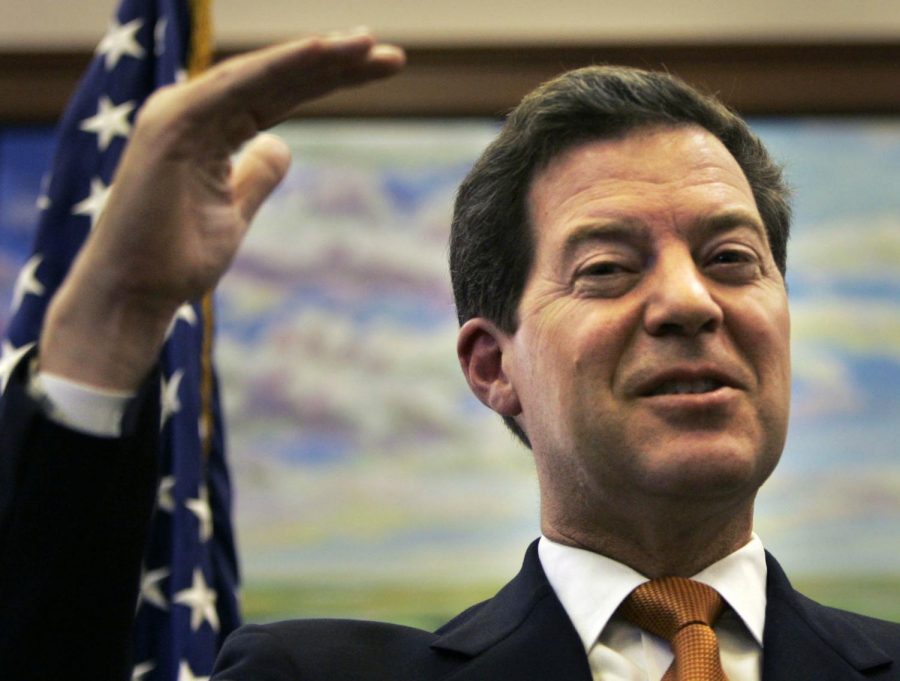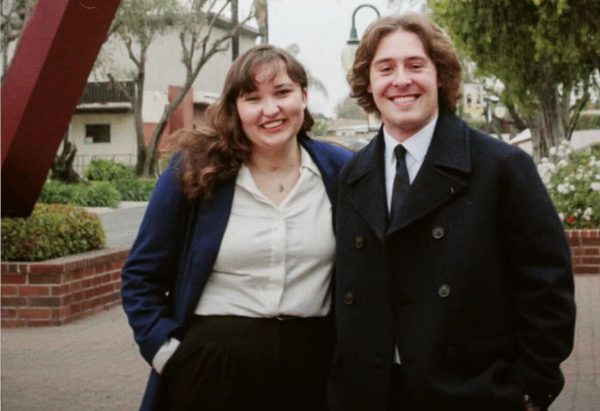Brownback bows out of GOP presidential field
Photo by AP Photo/Orlin Wagner
Sen. Sam Brownback, R-Kan., answers questions during a news conference at the State House in Topeka, Kan., Friday, Oct. 19.
October 19, 2007
Republican Sen. Sam Brownback formally abandoned his 2008 presidential campaign Friday, his efforts suffering from a lack of money and a failure to gain traction nationally.
The Kansas conservative managed to gain the support of only 1 percent of Republicans in this month’s Associated Press-Ipsos poll, after peaking at 3 percent in June. Fundraising reports earlier this week showed that his campaign was struggling financially, with $94,000 available to spend.
”My yellow brick road just came short of the White House this time,” Brownback said during a news conference at the Kansas Statehouse.
Several dozen supporters crowded into a committee room to watch Brownback end his campaign. He was flanked by young campaign volunteers, one of whom held a sign saying, ”We (heart) Sam).” His wife, Mary, and three of his five children stood with him.
”We’re out of money,” he said, explaining his departure. ”You have to be able to put enough lead on the target.”
He is expected to run for Kansas governor in 2010 when his second term expires. Brownback repeated his pledge that he wouldn’t run again for the Senate when his second term ends in 2010. He dismissed talk of future office, including nomination as vice president.
”I’ve got a full time job,” he said. ”I’ve not thought about that at all.”
Brownback had previously said that he would stay in the race through Iowa’s first-in-the-nation presidential caucuses in January, saying he would drop out of the field if he finished worse than fourth there. Throughout the summer, Brownback spent considerable time and money in Iowa leading up to the August straw poll.
However, he finished third to former Massachusetts Gov. Mitt Romney and former Arkansas Gov. Mike Huckabee.
”Things had to break for us,” Brownback said.
Voters appeared to split their support between Brownback and Huckabee, a Southern Baptist minister who like the Kansan had strong conservative credentials. Huckabee’s campaign could stand to gain the most by Brownback’s departure, especially among religious conservatives who share opposition to abortion and gay marriage.
”I don’t think that conservatives are divided, I just think they are undecided,” Brownback said.
”Huckabee becomes the only real alternative for them. It’s a small plus, but still a plus,” Duke University political scientist Dave Rohde said.
Rohde said a candidate with Brownback’s lack of prominence needed to raise a lot of money or have situations break his way, such as his stance on stemming violence in Sudan or partitioning Iraq to end the war.
”Nothing happened to make him get lucky. Perhaps the worst thing is Huckabee did well in Iowa,” Rohde said. ”He gave it a shot.”
Brownback frequently targeted Romney in Iowa, accusing him of changing his views on abortion and other social issues. Asked if he would be looking for Brownback’s endorsement, Romney said he would ”love the support of as many people as I could get.”
Speaking to reporters on the campaign trail in Iowa, Romney said Brownback ”had a sound message” for voters.
”I think he ran a good and spirited campaign,” Romney said. ”I thought he did well in the debates and was a voice of clarity and reason in the debates.
”I don’t celebrate his leaving the campaign.”
Brownback’s return to Kansas could signal a shift in his political focus. Many expect him to compete for the Republican nomination for governor in 2010, after he’s served 14 years in the Senate. It will be an open race because Democratic Gov. Kathleen Sebelius is prohibited by the state constitution from seeking a third consecutive term.
The GOP field is already filling up, with Secretary of State Ron Thornburgh and Rep. Jerry Moran, who represents the 1st District of predominantly western Kansas, already raising money.
Brownback, 51, is a former Kansas agriculture secretary who won a seat in the U.S. House in 1994, the same year voters angry with Democratic President Bill Clinton swept the GOP back into congressional majorities.
Two years later, Senate Majority Leader Bob Dole resigned his seat to run for president, and Brownback challenged the person named to replace Dole, Sheila Frahm. He defeated her in the GOP primary, captured Dole’s seat and won a full term in 1998. He was re-elected easily in 2004.
He is known for his passionate opposition to abortion, gay marriage and embryonic stem cell research. But his pledge to ”rebuild the family and renew the culture” never quite resonated enough with voters as he ran for president.
GOP officials said the crowded presidential field made it difficult for Brownback to break out of the pack.
”There were too many conservatives in the race and Huckabee took off in the straw poll and that gave him some momentum that Brownback didn’t have,” said Des Moines lawyer Steve Roberts, a member of the Republican National Committee.
GOP strategist Rich Galen said Brownback was running out of time and money to get the momentum he needed for a strong showing in the Iowa caucuses.
”It really requires somebody like Senator Brownback to get off to a very quick start and kind of make a name for himself,” said Galen, who is advising Fred Thompson’s presidential campaign. ”He slogged it out. He went all in, in Iowa, and it didn’t work out the way he wanted to.”
While he spent much of his time on the campaign trail in Iowa, New Hampshire and other states, Brownback faced some criticism back home for missing more than 35 percent of roll call votes in the Senate. Brownback apologized Friday for missing those votes.
”I’m back,” he declared.
Associated Press writers Sam Hananel in Washington, D.C., and Amy Lorentzen in Treynor, Iowa, contributed to this story.







